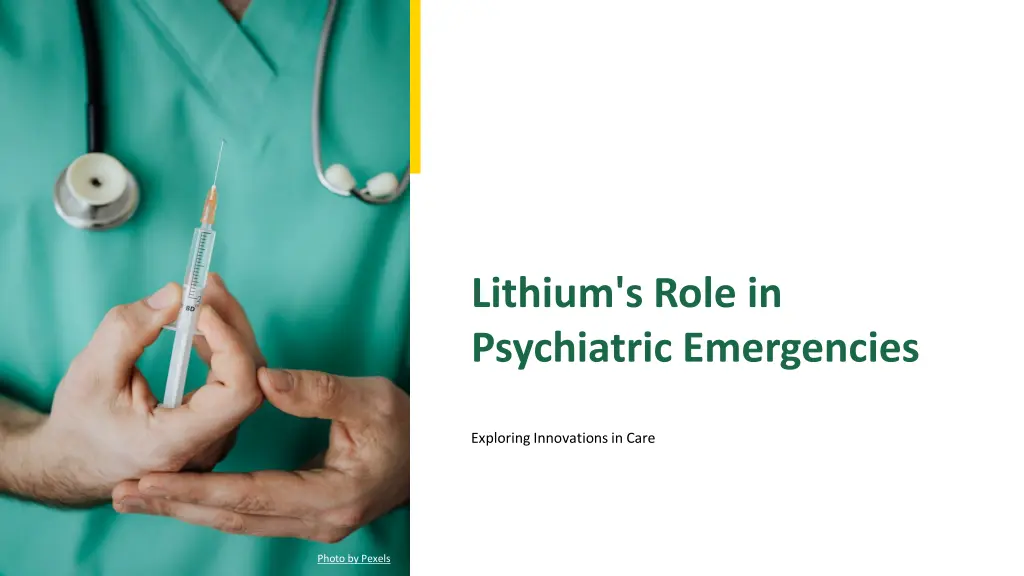
Exploring Lithium's Role in Psychiatric Emergencies
"Discover the significance of lithium in managing psychiatric emergencies, focusing on its history, pharmacology, indications for use, and clinical impact. Learn how innovative approaches can improve patient outcomes in crisis situations."
Download Presentation

Please find below an Image/Link to download the presentation.
The content on the website is provided AS IS for your information and personal use only. It may not be sold, licensed, or shared on other websites without obtaining consent from the author. If you encounter any issues during the download, it is possible that the publisher has removed the file from their server.
You are allowed to download the files provided on this website for personal or commercial use, subject to the condition that they are used lawfully. All files are the property of their respective owners.
The content on the website is provided AS IS for your information and personal use only. It may not be sold, licensed, or shared on other websites without obtaining consent from the author.
E N D
Presentation Transcript
Lithium's Role in Psychiatric Emergencies Exploring Innovations in Care Photo by Pexels
01 Introduction to Lithium Salt Table of Contents 02 Historical Context 03 Pharmacology of Lithium 04 Indications for Use 05 Clinical Presentation 06 Epidemiology of Bipolar Disorder 07 Evaluation of Knowledge 08 Innovative Approaches 09 Challenges in Implementation 10 Summary of Key Points 11 Thank You!
1 Introduction to Lithium Salt A Revolutionary Treatment Lithium salt has been a cornerstone in treating psychiatric emergencies, particularly for bipolar disorder and acute mood episodes. Dr. Jean Obolo's research focuses on evaluating the introduction of lithium in emergency situations within clinical settings. Understanding lithium's impact can lead to improved outcomes in psychiatric emergency care and stabilization of patients. This presentation will explore lithium s history, pharmacology, and its critical role in psychiatric emergencies. Photo by Pexels
2 Historical Context Journey Through Time Lithium's history dates back to the 19th century, initially discovered for its therapeutic potentialin mood disorders. Over decades, it has evolved from a chemical curiosity to a preferredtreatment for bipolar disorder's acute phases. Recognizing its journey helps us appreciate its significance in modern psychiatric care. The historical developments pave the way for understanding currentpractices in emergency settings. Photo by Pexels
3 Pharmacology of Lithium Understanding Mechanisms Lithium's pharmacological properties affect neurotransmitter systems, particularly serotonin and norepinephrine, stabilizing mood fluctuations. By modulating second-messenger systems, lithium enhances neuroprotective effects crucial for bipolar patients. Understanding these mechanisms helps clinicians utilize lithium effectively in emergencies. Exploring pharmacology informs treatment protocols to maximize patient safety and outcomes. Photo by Pexels
4 Indications for Use When to Administer? Lithium is indicated for acute mania, depressive episodes, and for patients with a history of bipolar disorder. Recognizing these indications ensures timely intervention in psychiatric emergencies. Proper indication leads to rapid stabilization, reducing the risk of escalation of psychiatric symptoms. Knowing when to use lithium can significantly enhance treatment effectiveness in emergency care. Photo by Pexels
5 Clinical Presentation Patient Scenarios Clinical cases demonstrate the diversity of symptom presentation in psychiatric emergencies requiring lithium management. Understanding these presentations aids in swift diagnosis and treatment, improving care quality. Case studies illustrate how timely lithium initiation has transformed patientoutcomes. Real-world applications of lithium showcase its vital role in emergency psychiatric care. Photo by Pexels
6 Epidemiology of Bipolar Disorder Understanding Prevalence Bipolar disorder affects approximately 1-3% of the population, with significant implications for emergency psychiatric care. Recognizing epidemiological data helps in resource allocation and preparedness for emergency responses. Understanding the demographics can guide healthcare systems in managing emergent cases effectively. Epidemiological insights shape policy and practice in addressing psychiatric emergencies. Photo by Pexels
7 Evaluation of Knowledge Assessing Understanding Evaluating the knowledge of lithium use in emergencies highlights gaps in training and education among healthcare providers. Surveys and assessments can identify critical areas needing improvement to enhance patient care. A well-informed healthcare team ensures better outcomes with lithium in psychiatric emergencies. Continuous education is paramount for optimal utilization of lithium in these critical situations. Photo by Pexels
8 Innovative Approaches Future Directions Exploring new methodologies in lithium administration may enhance its efficacy in emergency situations. Investigating combined therapies with lithium could yield better management of acute episodes in patients. Research into personalized lithium protocols can lead to more tailored and effective treatments. Innovation plays a vital role in advancing psychiatric emergency care throughlithium management. Photo by Pexels
9 Challenges in Implementation Overcoming Barriers Despite its efficacy, barriers exist in lithium's use, including monitoring requirements and stigma associated with psychiatric illness. Addressing these challenges can improve treatment adherence and patientoutcomes in emergencies. Developing standardized protocols can mitigate implementation issues faced by healthcare providers. Identifying and overcoming barriers is essential for maximizing lithium's potentialbenefits. Photo by Pexels
10 Summary of Key Points Insights Recap Lithium has a historical significance and a vital role in managing psychiatric emergencies, particularly in bipolar disorder. Understanding its pharmacology, indications, and clinical presentation enhances its effective use in emergencies. Evaluation of knowledge, innovative approaches, and overcoming challenges are crucial for optimal lithium management. These insights set the stage for improved psychiatric care in emergency settings. Photo by Pexels
11 Thank You! Appreciation for Attention Thank you for engaging with this presentation on lithium's critical role in psychiatric emergencies. Your interest in exploring innovative approaches to improve emergency psychiatric care is invaluable. Together, we can enhance the understanding and implementation of effective lithium treatment protocols. Let's work towards a future where every patient receives optimal care duringtheir most critical moments. Photo by Pexels
